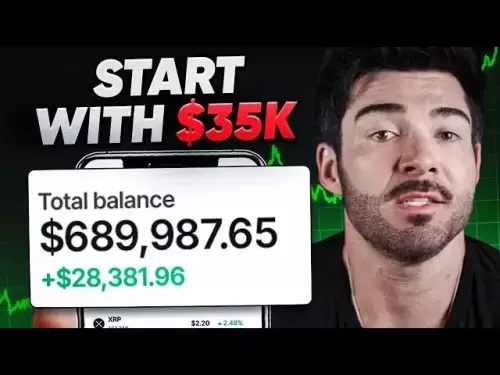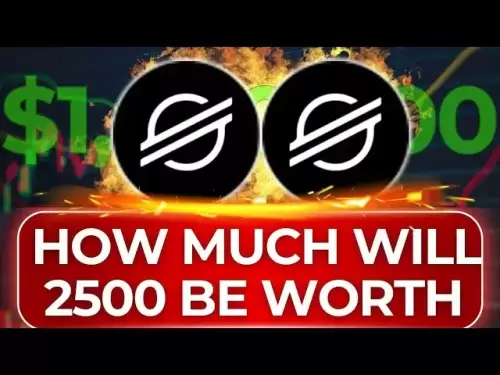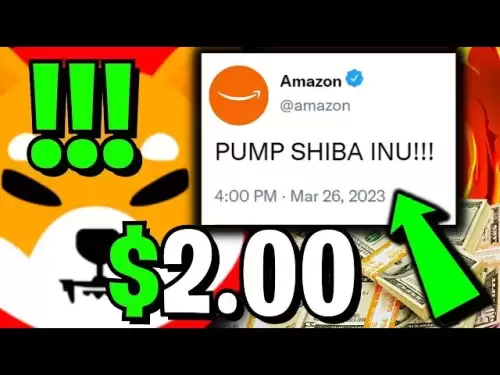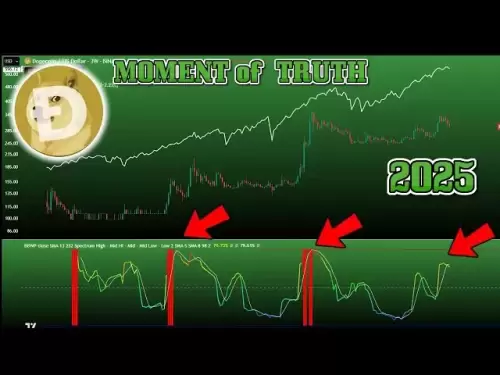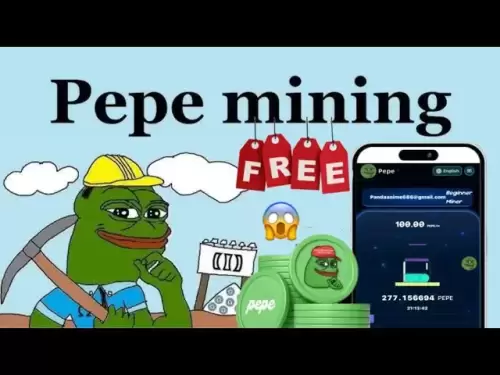-
 Bitcoin
Bitcoin $104,624.9583
1.23% -
 Ethereum
Ethereum $2,400.5263
-3.31% -
 Tether USDt
Tether USDt $1.0001
-0.01% -
 XRP
XRP $2.3758
0.61% -
 BNB
BNB $641.9094
-0.09% -
 Solana
Solana $166.6828
-0.28% -
 USDC
USDC $0.9999
0.00% -
 Dogecoin
Dogecoin $0.2226
2.78% -
 Cardano
Cardano $0.7371
-0.79% -
 TRON
TRON $0.2631
-3.66% -
 Sui
Sui $3.7916
0.32% -
 Chainlink
Chainlink $15.3045
-0.64% -
 Avalanche
Avalanche $22.1811
-0.39% -
 Stellar
Stellar $0.2844
-0.95% -
 Hyperliquid
Hyperliquid $26.2058
-0.73% -
 Shiba Inu
Shiba Inu $0.0...01453
1.61% -
 Hedera
Hedera $0.1928
0.63% -
 UNUS SED LEO
UNUS SED LEO $8.6530
-0.14% -
 Bitcoin Cash
Bitcoin Cash $397.7356
0.31% -
 Toncoin
Toncoin $3.0712
-0.35% -
 Litecoin
Litecoin $98.4875
1.81% -
 Polkadot
Polkadot $4.6009
-0.58% -
 Monero
Monero $341.9796
0.70% -
 Bitget Token
Bitget Token $5.2188
4.91% -
 Pepe
Pepe $0.0...01308
5.92% -
 Dai
Dai $0.9998
-0.02% -
 Pi
Pi $0.7388
4.34% -
 Ethena USDe
Ethena USDe $1.0005
-0.02% -
 Uniswap
Uniswap $5.8283
1.48% -
 Bittensor
Bittensor $412.5114
-2.39%
best crypto to buy as a beginner
Diversify your cryptocurrency portfolio by investing in a combination of established tokens like Bitcoin and Ethereum, as well as emerging coins such as Solana and Cardano, to mitigate risk and maximize potential returns.
Jan 29, 2025 at 08:49 pm
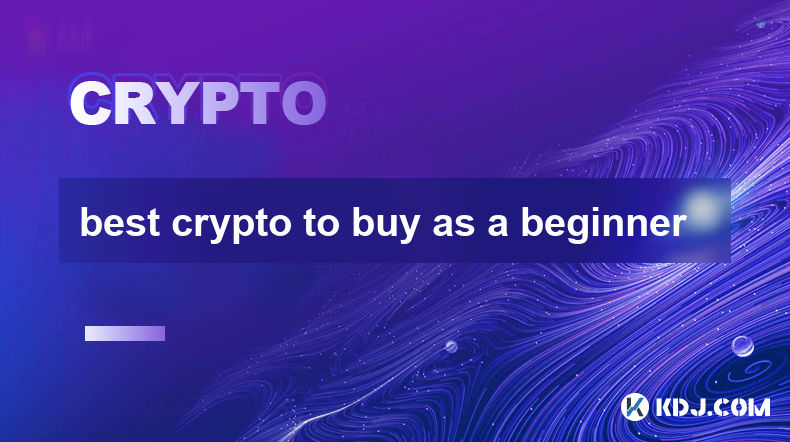
Key Points
- Consider carefully the purpose, timeframe, and risk tolerance for your investment.
- Research and analyze potential cryptocurrencies, focusing on their market capitalization, technology, and team.
- Diversify your portfolio by investing in a mix of established and emerging cryptocurrencies.
- Stay informed of market trends and news to make informed investment decisions.
- Use reputable and secure cryptocurrency exchanges or trading platforms.
Best Cryptocurrencies for Beginners
1. Bitcoin (BTC)
- Launched in 2009, Bitcoin is the original and most well-known cryptocurrency.
- It boasts a large market capitalization, providing stability and liquidity.
- Its decentralized and censorship-resistant nature offers security and privacy.
2. Ethereum (ETH)
- Ethereum is a versatile platform supporting smart contracts and decentralized applications.
- Its native token, ETH, is used to pay transaction fees and interact with Ethereum-based platforms.
- Ethereum's potential for growth in the decentralized finance (DeFi) and non-fungible token (NFT) space is significant.
3. Binance Coin (BNB)
- Binance Coin is the native token of the Binance exchange, one of the largest and most reputable cryptocurrency exchanges.
- BNB offers utility within the Binance ecosystem, including discounts on trading fees and access to exclusive features.
- Binance Coin has a strong use case and is expected to continue being valuable as the Binance exchange grows.
4. Solana (SOL)
- Solana is a newer blockchain platform known for its high scalability and throughput.
- Its native token, SOL, is used to secure the network and pay transaction fees.
- Solana is rapidly attracting developers and new projects, making it a potential up-and-comer in the cryptocurrency space.
5. Cardano (ADA)
- Cardano is a proof-of-stake blockchain platform focused on security and scalability.
- Its native token, ADA, is used to stake for rewards and participate in governance.
- Cardano has a strong community and is continually evolving, making it a promising option for long-term investors.
6. Polkadot (DOT)
- Polkadot is a multi-chain platform that connects multiple blockchains and enables interoperability.
- Its native token, DOT, is used to secure the network, bondvalidators, and participate in governance.
- Polkadot's potential to revolutionize interoperability within the cryptocurrency ecosystem is significant.
7. Polygon (MATIC)
- Polygon is a layer-2 scaling solution for Ethereum, aimed at reducing transaction fees and improving speed.
- Its native token, MATIC, is used to pay transaction fees and participate in network governance.
- Polygon's compatibility with Ethereum makes it a convenient option for Ethereum developers and users.
8. Chainlink (LINK)
- Chainlink is a decentralized oracle network that provides secure and reliable data to smart contracts.
- Its native token, LINK, is used to incentivize LINK node operators to provide accurate data.
- Chainlink's potential to enhance the capabilities of smart contracts is significant.
9. The Sandbox (SAND)
- The Sandbox is a decentralized virtual world where users can create, share, and sell digital assets.
- Its native token, SAND, is used for in-game transactions and purchasing digital land.
- The Sandbox offers unique opportunities for creators and investors interested in the metaverse and gaming.
10. Decentraland (MANA)
- Decentraland is another decentralized virtual world where users can own and develop virtual land.
- Its native token, MANA, is used for purchasing land, in-game items, and voting on governance proposals.
- Decentraland's potential in the virtual real estate market is significant.
FAQs
Q: How much should I invest in cryptocurrency as a beginner?
- Invest only what you can afford to lose and within your risk tolerance. Start with a small amount and gradually increase your investment as you gain experience.
Q: How do I store my cryptocurrency?
- Use a secure hardware wallet to store your private keys and protect your funds. Consider reputable custodians or exchanges for large amounts.
Q: What is the risk involved in investing in cryptocurrency?
- Cryptocurrency markets are volatile and speculative. Research thoroughly and understand the risks involved before making any investment decisions.
Q: How do I stay informed about cryptocurrency news and trends?
- Follow reputable news outlets, subscribe to podcasts, and join online communities to stay updated on the latest developments in the cryptocurrency space.
Q: Is it too late to invest in cryptocurrency?
- Cryptocurrency adoption is still in its early stages. While prices have been volatile, the potential for long-term growth and innovation remains significant.
Disclaimer:info@kdj.com
The information provided is not trading advice. kdj.com does not assume any responsibility for any investments made based on the information provided in this article. Cryptocurrencies are highly volatile and it is highly recommended that you invest with caution after thorough research!
If you believe that the content used on this website infringes your copyright, please contact us immediately (info@kdj.com) and we will delete it promptly.
- Ruvi (RUVI) Captures Attention as a Revolutionary New Project Harnessing the Power of AI and Blockchain
- 2025-05-19 11:20:12
- XRP Price Action Will Be Closely Monitored as Market Awaits a Breakout Above the $2.50 Resistance Zone
- 2025-05-19 11:20:12
- China Reduced Exposure to U.S. Debt Amid Tariff Conflict
- 2025-05-19 11:15:13
- Bitcoin (BTC) Price Prediction: CVDD Metrics Hint At $120k Peak, But Only If $90k Support Holds
- 2025-05-19 11:15:13
- Pi (PI) Price Prediction For May 19: Will Buyers Break Above $0.78 Resistance?
- 2025-05-19 11:10:13
- Dogecoin price surges past the $0.30 mark, reigniting market enthusiasm.
- 2025-05-19 11:10:13
Related knowledge

What is Ethereum’s Slashing mechanism and how to punish malicious behavior?
Feb 20,2025 at 03:08am
Key PointsOverview of slashingDifferent types of slashing in EthereumIncentives and consequences of slashingIdentifying and reporting slashed validatorsOngoing discussions and potential improvementsEthereum's Slashing Mechanism: Punishing Malicious BehaviorEthereum's slashing mechanism is an essential tool for ensuring network security and punishing mal...

What is the verifier node of Ethereum and how to become a verifier?
Feb 19,2025 at 06:00pm
The Verifier Node of Ethereum: A Comprehensive GuideKey Points:What is a Verifier Node?How to Become a Verifier NodeResponsibilities and Rewards of a Verifier NodeMinimum Requirements for Becoming a Verifier NodePotential Difficulties in Running a Verifier Node1. What is a Verifier Node?A Verifier Node is an independent entity on the Ethereum network th...

What is Ethereum’s staking, and how to participate and earn money?
Feb 19,2025 at 04:37pm
Key Points:Understanding Ethereum's Staking MechanismSteps to Participate in StakingBenefits and Rewards of StakingSecurity and Risk ConsiderationsTechnical Requirements and Hardware OptionsPotential Challenges and Troubleshooting TipsFAQs on Ethereum StakingWhat is Ethereum's Staking?Proof-of-Stake (PoS) is a consensus mechanism used in blockchain netw...

What is Ethereum’s DAO (Decentralized Autonomous Organization) and how does it work?
Feb 20,2025 at 03:12am
Key PointsDefinition and Structure of a DAOGovernance and Decision-Making in DAOsBenefits and Use Cases of DAOsChallenges and Limitations of DAOsWhat is Ethereum's DAO (Decentralized Autonomous Organization) and How Does It Work?Definition and Structure of a DAOA Decentralized Autonomous Organization (DAO) is an innovative governance and management fram...

What is Ethereum's multi-signature wallet and how to improve security?
Feb 20,2025 at 02:18pm
Key Points:Understanding the Concept of a Multi-Signature WalletBenefits and Drawbacks of Multisig WalletsRequirements for Setting Up a Multisig WalletStep-by-Step Guide to Generating a Multisig WalletImplementing Strategies for Enhanced Security1. Understanding the Concept of a Multi-Signature WalletA multi-signature (multisig) wallet in the Ethereum e...

What is Ethereum's oracle and how to provide data for smart contracts?
Feb 21,2025 at 01:30am
Key Points:Understanding the concept of oracles in EthereumExploring different types of oraclesDetailed guide on how to provide data for smart contractsAddressing potential challenges and considerationsWhat is Ethereum's Oracle?Oracles are crucial components in the Ethereum ecosystem, enabling smart contracts to access real-world data and off-chain even...

What is Ethereum’s Slashing mechanism and how to punish malicious behavior?
Feb 20,2025 at 03:08am
Key PointsOverview of slashingDifferent types of slashing in EthereumIncentives and consequences of slashingIdentifying and reporting slashed validatorsOngoing discussions and potential improvementsEthereum's Slashing Mechanism: Punishing Malicious BehaviorEthereum's slashing mechanism is an essential tool for ensuring network security and punishing mal...

What is the verifier node of Ethereum and how to become a verifier?
Feb 19,2025 at 06:00pm
The Verifier Node of Ethereum: A Comprehensive GuideKey Points:What is a Verifier Node?How to Become a Verifier NodeResponsibilities and Rewards of a Verifier NodeMinimum Requirements for Becoming a Verifier NodePotential Difficulties in Running a Verifier Node1. What is a Verifier Node?A Verifier Node is an independent entity on the Ethereum network th...

What is Ethereum’s staking, and how to participate and earn money?
Feb 19,2025 at 04:37pm
Key Points:Understanding Ethereum's Staking MechanismSteps to Participate in StakingBenefits and Rewards of StakingSecurity and Risk ConsiderationsTechnical Requirements and Hardware OptionsPotential Challenges and Troubleshooting TipsFAQs on Ethereum StakingWhat is Ethereum's Staking?Proof-of-Stake (PoS) is a consensus mechanism used in blockchain netw...

What is Ethereum’s DAO (Decentralized Autonomous Organization) and how does it work?
Feb 20,2025 at 03:12am
Key PointsDefinition and Structure of a DAOGovernance and Decision-Making in DAOsBenefits and Use Cases of DAOsChallenges and Limitations of DAOsWhat is Ethereum's DAO (Decentralized Autonomous Organization) and How Does It Work?Definition and Structure of a DAOA Decentralized Autonomous Organization (DAO) is an innovative governance and management fram...

What is Ethereum's multi-signature wallet and how to improve security?
Feb 20,2025 at 02:18pm
Key Points:Understanding the Concept of a Multi-Signature WalletBenefits and Drawbacks of Multisig WalletsRequirements for Setting Up a Multisig WalletStep-by-Step Guide to Generating a Multisig WalletImplementing Strategies for Enhanced Security1. Understanding the Concept of a Multi-Signature WalletA multi-signature (multisig) wallet in the Ethereum e...

What is Ethereum's oracle and how to provide data for smart contracts?
Feb 21,2025 at 01:30am
Key Points:Understanding the concept of oracles in EthereumExploring different types of oraclesDetailed guide on how to provide data for smart contractsAddressing potential challenges and considerationsWhat is Ethereum's Oracle?Oracles are crucial components in the Ethereum ecosystem, enabling smart contracts to access real-world data and off-chain even...
See all articles




















